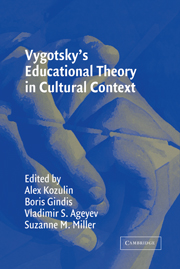Book contents
- Frontmatter
- Contents
- List of Contributors
- Series Foreword
- Introduction: Sociocultural Theory and Education: Students, Teachers, and Knowledge
- PART I CONCEPTS AND PARADIGMS
- PART II DEVELOPMENT AND LEARNING
- 6 Periods in Child Development
- 7 Development Through the Lifespan
- 8 Learning and Development of Preschool Children from the Vygotskian Perspective
- 9 The Learning Activity in the First Years of Schooling
- 10 Remediation Through Educationw
- PART III SOCIOCULTURAL THEORY APPLICATION IN THE CLASSROOM
- PART IV DIVERSE LEARNERS AND CONTEXTS OF EDUCATION
- Author Index
- Subject Index
- Titles in the series
- References
9 - The Learning Activity in the First Years of Schooling
The Developmental Path Toward Reflection
Published online by Cambridge University Press: 05 June 2012
- Frontmatter
- Contents
- List of Contributors
- Series Foreword
- Introduction: Sociocultural Theory and Education: Students, Teachers, and Knowledge
- PART I CONCEPTS AND PARADIGMS
- PART II DEVELOPMENT AND LEARNING
- 6 Periods in Child Development
- 7 Development Through the Lifespan
- 8 Learning and Development of Preschool Children from the Vygotskian Perspective
- 9 The Learning Activity in the First Years of Schooling
- 10 Remediation Through Educationw
- PART III SOCIOCULTURAL THEORY APPLICATION IN THE CLASSROOM
- PART IV DIVERSE LEARNERS AND CONTEXTS OF EDUCATION
- Author Index
- Subject Index
- Titles in the series
- References
Summary
The notion learning activity in its broad meaning comprises the educational practices that treat the student as not only a performer of a teacher's instructions but, more important, as the agent of cognitive actions that are distributed between the teacher and the student. With the emphasis on activity of the learner, the term learning activity refers to a diverse set of educational practices that are consistent with constructivist theories. The educational philosopher John Dewey and the developmental psychologists Lev Vygotsky, Jean Piaget, and Jerome Bruner, among others, propose that children actively construct knowledge, and that this knowledge is constructed in a social context. Accordingly, it is the student who sets the goals, searches for the means and methods to achieve them, and engages in self-control and self-evaluation of the achievements that result.
The term and the concept of learning activity, in its narrow sense, were developed in the late 1950s by Daniil Elkonin (1904–1984). A student and associate of Lev Vygotsky, this prominent Russian developmental and educational psychologist strongly influenced several generations of educators and researchers in his country. Elkonin and his immediate associate Vassily Davydov (1930–1998) worked out an innovative theory of education along with the associated educational practices that both embody and exemplify the theory. This system of education helps the child to become the agent of self-change aimed at transcending the limits of one's own experience, knowledge, skills, and abilities and at acquiring methods for self-learning (Davydov, 1988; Elkonin, 1988).
- Type
- Chapter
- Information
- Vygotsky's Educational Theory in Cultural Context , pp. 177 - 199Publisher: Cambridge University PressPrint publication year: 2003
References
- 23
- Cited by



